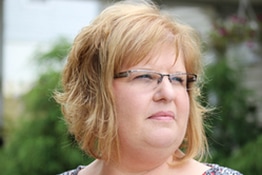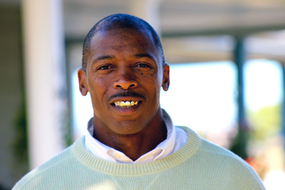|
A Conversation with the Executive Director  Executive Director, Sharon Glick Executive Director, Sharon Glick Sharon Glick has been in charge of the day-to-day operations of Gemeinschaft Home for almost four years, and her commitment to the residents and staff has never been greater. There is rarely a dull moment in Executive Director, Sharon Glick’s office, a cozy corner space located within the bustling reception and administration area of the house. With natural light pouring into the room from a large window—which she prefers over the fluorescent lighting overhead—Glick, known informally as "Ms. Sharon" to the residents and staff, spends most of her day either behind her computer desk or seated at a small table, engaged in near constant discussions with a steady stream of people trickling in and out of her workspace on any given day. “My door is always open, which does drive some of my staff crazy, but unless I am working on something I need to finish, I will always stop,” she explains, but adds that such flexibility just goes with the territory of the job—“You never know what it going to go on here.” Her open-door policy applies to everyone, staff as well as the residents, and serves as a metaphor for Glick’s leadership philosophy, an approach that embodies her effort to create a team-based community. “Executive Director, “ she says, “that’s just my title, but that doesn’t define who I am.” In fact, when residents arrive at Gemeinschaft Home, and Glick is currently in the office, she says, “I just go out and tell them, ‘I am Sharon. What’s your name?” She also explains, “I call residents by their first names. I may have to ask for a reminder, but generally I remember all of their names.” The rapport that Glick develops with residents stems in part from a choice she makes early on regarding their past experiences. “I do not read their jackets [case files with each resident’s criminal history] before they get here, she says, “Most of the gentlemen go completely through [the program], and I never open it, because the person who is demonstrated on paper, is just from one period of time in [his] life.” Instead she focuses on the present moment, with an eye on the future, and she encourages residents to do the same. Glick argues, “We have to show grace and forgiveness, because some of these guys have not been brought up in an environment that says, ‘You messed up today [or yesterday], but it’s ok. We’ve dealt with it; we move on.” Yet, moving forward presents a range of difficulties for many of the residents who work to transition from being incarcerated to living in society at large. “Guys don’t deal with the change easily,” Glick says, “We work on flexibility. We deal with anxiety. We deal with all sorts of stuff,” and “I constantly tell them that time is their friend. They don’t have to go from point A to point Z in 2 seconds.” She explains that many residents struggle with regaining or repairing connections with alienated family members, spouses, and making up for lost time with their children. Therefore much of Glick’s interactions with residents is aimed at helping them to slow down and to focus on their own progress in the program as the means to reaching their long-term family and relationship goals down the road. While wearing a number of hats in the role of director—managing staff, communicating with Department of Corrections probation and parole officers, meeting with board members, donors, and visitors—“I cannot imagine doing anything else,” Glick proclaims as she nears her fourth year in the position, but her interactions with the residents of Gemeinschaft Home provide the greatest reward. “People often speak of how much my staff and I invest in the residents, but I tell people that they have no idea how much they touch us, and it is far more than we give them,” Glick says, and she believes, “There is good in everybody. They just went through a period of time, but that time does not define who they are; they definitely touch my life.” “There is always some sort of circumstance, or a crisis, or something happening,” but “I choose to put myself in their lives. I could just shut the door, and I could easily get all of my bookkeeping and similar work done,” says Glick. Instead she prefers a more involved relationship with the people who make Gemeinschaft Home what it is--the residents. Her advice to them: “If you can’t change it, do not get stuck in it; do not dwell on it. There is no point in dwelling on [the past]. Make today all it can be. Live today like it’s your last day.” “I don’t tell them anything different than what I try to practice myself,” she concludes. An Inside Look at Resident's Experience  Resident, Michael Richardson Resident, Michael Richardson Making the transition back into society after a period of incarceration is not an easy task, and every resident faces one roadblock or another on the way to his life after prison, but there are also moments of success. Current resident Michael Richardson shares his own experience living at Gemeinschaft Home and talks about the skills he has gained as well as the challenges he still faces. For Richardson, like many residents, the one-on-one and group interaction aspects of the Gemeinschaft Home program were not easy at first, but proved to be the most helpful part of his experience. Richardson reveals, “Probably for the first three weeks, I didn’t have anything to say, but once I got comfortable, and listened to what was going on, I felt more relaxed to be outspoken, to get feedback, and to add insight.” He also admits that while he has never been a people-person, at Gemeinschaft Home he has nevertheless become more sociable: “I have learned how to be more responsive to people, as opposed to lashing out at people,” gaining “the ability to read people, the ability to trust people a little bit.” All residents are required to become employed during their stay at Gemeinschaft Home, which is no doubt a critical component of becoming productive members of society, but it also represents a formidable challenge for most. Richardson began working during his second week at Gemeinschaft Home, and has been grateful for the opportunity to show what he has to offer, but as he now looks for jobs based on his training and skills, things get more complicated. Richardson explains, “I am a mechanic by trade, and I have been doing that for over 20 years; I know it really well.” Yet, “Even though I am skilled and qualified and have the resume to go along with what I know how to do, people just automatically shut the door on me, just because of the social stigma that comes when they hear that term, ‘ex-felon’ or ‘con,’ without really knowing anything about me.” He continues, “People [often] think the worst, as in someone who just shot up a school or killed a little girl or an old lady. Especially with so much gun violence, those are the first things that come to people’s minds.” Richardson insists that while he indeed has a criminal history, he is not a violent person and seeks to hurt no one, adding, “I have something to offer; I am not here to take anything.” Despite the challenges, Richardson remains optimistic and points to Gemeinschaft Home as the reason, saying, “I don’t know where I would be right now, honestly I don’t. I have gotten a lot of help here from the counselors, Jumar and Richie, and everybody on the staff here has helped me in some kind of way, and I am grateful for it.” Richardson reveals, “It’s been three months already, and when I speak to my mother and family members, they see a difference in me.” |
Archives
August 2023
|